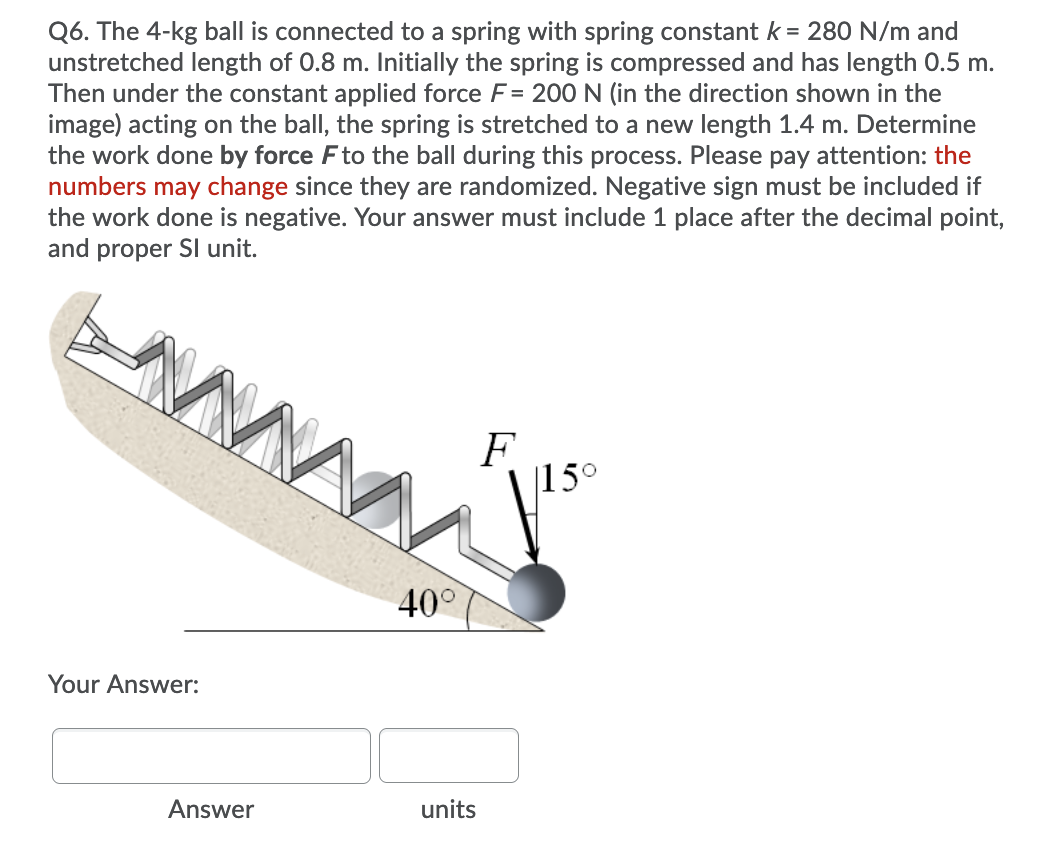Q6. The 4-kg ball is connected to a spring with spring constant k = 280 N/m and unstretched length of 0.8 m. Initially the spring is compressed and has length 0.5 m. Then under the constant applied force F= 200N (in the direction shown in the image) acting on the ball, the spring is stretched to a new length 1.4 m. Determine the work done by force Fto the ball during this process. Please pay attention: the numbers may change since they are randomized. Negative sign must be included if the work done is negative. Your answer must include 1 place after the decimal point, and proper SI unit. F |15° 40°
Q6. The 4-kg ball is connected to a spring with spring constant k = 280 N/m and unstretched length of 0.8 m. Initially the spring is compressed and has length 0.5 m. Then under the constant applied force F= 200N (in the direction shown in the image) acting on the ball, the spring is stretched to a new length 1.4 m. Determine the work done by force Fto the ball during this process. Please pay attention: the numbers may change since they are randomized. Negative sign must be included if the work done is negative. Your answer must include 1 place after the decimal point, and proper SI unit. F |15° 40°
Elements Of Electromagnetics
7th Edition
ISBN:9780190698614
Author:Sadiku, Matthew N. O.
Publisher:Sadiku, Matthew N. O.
ChapterMA: Math Assessment
Section: Chapter Questions
Problem 1.1MA
Related questions
Question
I need help please

Transcribed Image Text:Q6. The 4-kg ball is connected to a spring with spring constant k = 280 N/m and
unstretched length of 0.8 m. Initially the spring is compressed and has length 0.5 m.
Then under the constant applied force F= 200N (in the direction shown in the
image) acting on the ball, the spring is stretched to a new length 1.4 m. Determine
the work done by force Fto the ball during this process. Please pay attention: the
numbers may change since they are randomized. Negative sign must be included if
the work done is negative. Your answer must include 1 place after the decimal point,
and proper SI unit.
F
|15°
40°
Your Answer:
Answer
units
Expert Solution
This question has been solved!
Explore an expertly crafted, step-by-step solution for a thorough understanding of key concepts.
Step by step
Solved in 3 steps with 2 images

Knowledge Booster
Learn more about
Need a deep-dive on the concept behind this application? Look no further. Learn more about this topic, mechanical-engineering and related others by exploring similar questions and additional content below.Recommended textbooks for you

Elements Of Electromagnetics
Mechanical Engineering
ISBN:
9780190698614
Author:
Sadiku, Matthew N. O.
Publisher:
Oxford University Press

Mechanics of Materials (10th Edition)
Mechanical Engineering
ISBN:
9780134319650
Author:
Russell C. Hibbeler
Publisher:
PEARSON

Thermodynamics: An Engineering Approach
Mechanical Engineering
ISBN:
9781259822674
Author:
Yunus A. Cengel Dr., Michael A. Boles
Publisher:
McGraw-Hill Education

Elements Of Electromagnetics
Mechanical Engineering
ISBN:
9780190698614
Author:
Sadiku, Matthew N. O.
Publisher:
Oxford University Press

Mechanics of Materials (10th Edition)
Mechanical Engineering
ISBN:
9780134319650
Author:
Russell C. Hibbeler
Publisher:
PEARSON

Thermodynamics: An Engineering Approach
Mechanical Engineering
ISBN:
9781259822674
Author:
Yunus A. Cengel Dr., Michael A. Boles
Publisher:
McGraw-Hill Education

Control Systems Engineering
Mechanical Engineering
ISBN:
9781118170519
Author:
Norman S. Nise
Publisher:
WILEY

Mechanics of Materials (MindTap Course List)
Mechanical Engineering
ISBN:
9781337093347
Author:
Barry J. Goodno, James M. Gere
Publisher:
Cengage Learning

Engineering Mechanics: Statics
Mechanical Engineering
ISBN:
9781118807330
Author:
James L. Meriam, L. G. Kraige, J. N. Bolton
Publisher:
WILEY